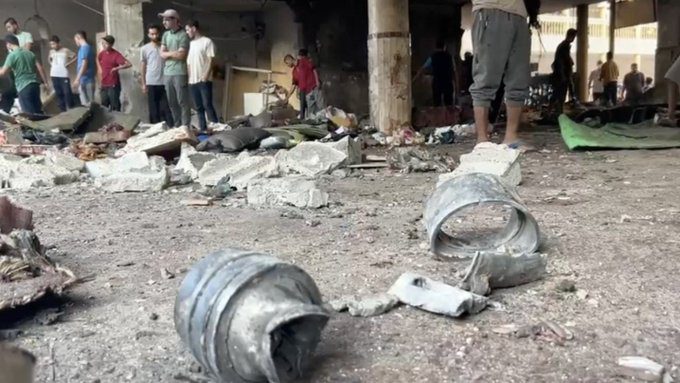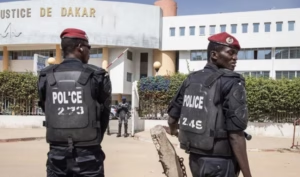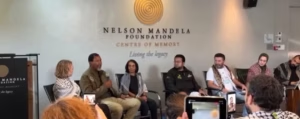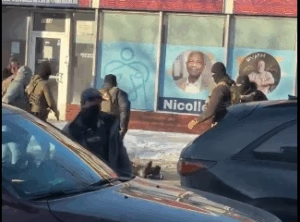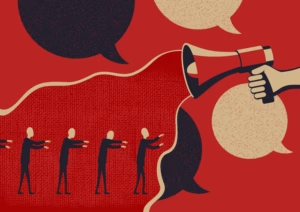Dozens of individuals have been killed, and many more injured, following an Israeli airstrike on a school-turned-shelter in Gaza City, according to statements from Palestinian authorities.
The strike targeted the Tabeen school, located in the central part of Gaza City, early on Saturday morning. This attack has been confirmed by both officials in Gaza and the Israel Defense Forces (IDF).
There are varying reports regarding the exact number of casualties. Al Jazeera, citing Gaza’s government media office, reported that over 100 people lost their lives in the bombing, with dozens more injured. The outlet also noted that not all bodies have been recovered yet.
World leaders condemn Israel’s latest ‘massacre’ on a Gaza City school, which killed more than 100 Palestinians. Israel claims it killed 19 fighters, without giving any evidence, as it continues its deadly bombardment.
🔴 Follow our LIVE coverage: https://t.co/lEI3rYr4Rm pic.twitter.com/APbQAG825G
— Al Jazeera English (@AJEnglish) August 11, 2024
On the other hand, the Associated Press (AP), referencing the Gaza Health Ministry’s ambulance and emergency service, reported a lower death toll of 60, with an additional 47 individuals wounded. The AP described this incident as “one of the deadliest strikes” in the ongoing ten-month conflict between Israel and the Palestinian armed group Hamas.
A statement from Gaza’s government media office attributed the high number of casualties to the timing of the attack, alleging that Israeli warplanes “bombed the displaced people [at the school] while they were performing the dawn prayer.”
“We hold the Israeli occupation and the American administration fully responsible for this massacre,”
the statement asserted. It further claimed that the airstrike
“comes within the framework of the crime of genocide and ethnic cleansing against our Palestinian people.”
Palestinian journalists on the scene reported that the school was hit by at least three bombs. Some survivors are believed to be trapped inside the building, which caught fire after the attack. Rescue efforts have been hindered due to Israel cutting off the water supply to the area, making it difficult for emergency workers to extinguish the blaze and reach those trapped.
The Israeli military, in a statement on the social media platform X (formerly known as Twitter), reiterated its position, claiming that the school was targeted because it had been used by Hamas as a headquarters for planning and promoting terrorist operations against IDF forces and Israeli civilians.
“Hamas systematically violates international law and operates from civilian shelters, using the population as a human shield,”
the IDF stated.
According to United Nations data, as of July 6, 477 out of 564 schools in Gaza, most of which had been repurposed as shelters for refugees, have been directly hit or damaged during the conflict.
Are the targeting of schools under the UN charter a war crime?
The targeting schools, particularly those that are being used as shelters or are otherwise not being used for military purposes, can be considered a war crime under international law, including the United Nations Charter and various other international treaties and conventions.
The United Nations Charter, while not explicitly addressing war crimes, sets out principles for the protection of civilians during armed conflicts. More directly relevant are the Geneva Conventions, particularly the Fourth Geneva Convention, which outlines the protections for civilians during times of war. Under these conventions, attacks on civilian infrastructure, including schools, hospitals, and places of worship, are prohibited unless these sites are being used for military purposes.
The Rome Statute of the International Criminal Court (ICC) further elaborates on what constitutes war crimes. According to Article 8 of the Rome Statute, “intentionally directing attacks against buildings dedicated to religion, education, art, science or charitable purposes, historic monuments, hospitals, and places where the sick and wounded are collected, provided they are not military objectives,” is classified as a war crime.
In situations where schools are used as shelters for civilians or as educational institutions and are not being used for military operations, deliberately targeting them could be prosecuted as a war crime. However, if a school is being used for military purposes, such as serving as a base for armed groups or storing weapons, it may lose its protected status under international law. Even in such cases, however, the attacking party must take all feasible precautions to avoid or minimize harm to civilians and civilian objects.
The distinction between a legitimate military target and a civilian object is crucial, and the principle of proportionality must be adhered to, meaning that the military advantage gained from the attack must outweigh the potential harm to civilians. Failure to adhere to these principles can lead to accusations of war crimes.
For authoritative information on the legality of targeting schools under international law, the following sources are commonly referenced:
- Geneva Conventions and Additional Protocols: These are the primary international treaties that outline the laws of war, including protections for civilians and civilian objects such as schools. You can review the Fourth Geneva Convention and Additional Protocol I, which are directly relevant, on the International Committee of the Red Cross (ICRC) website:
- Rome Statute of the International Criminal Court (ICC): The Rome Statute establishes the ICC and defines what constitutes war crimes, including the targeting of schools. The relevant sections can be found on the ICC’s official website:
These sources provide the legal framework and definitions necessary to understand the protections afforded to schools and other civilian infrastructure during armed conflicts.

